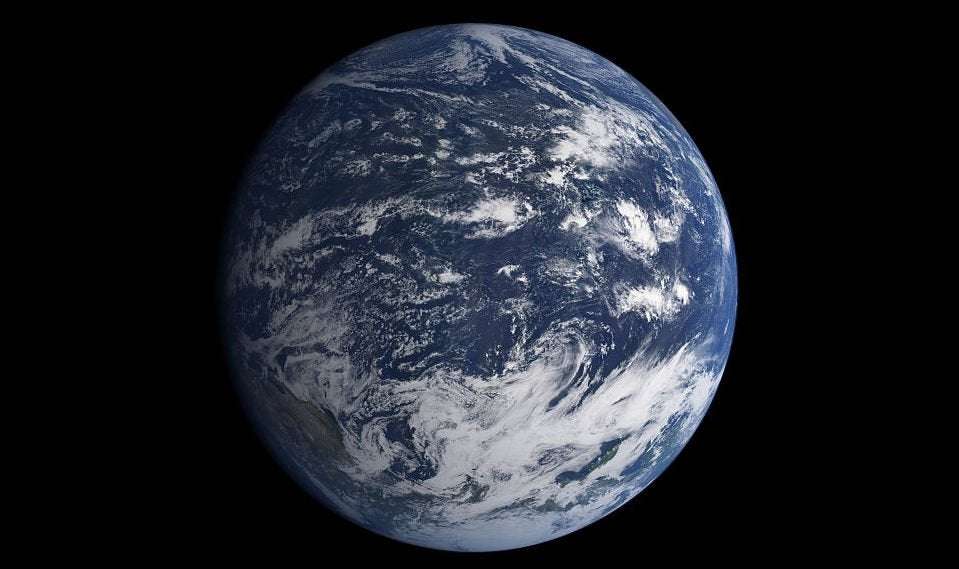Despite Earth’s abundant present-day oceans, many mysteries remain about their origins. Did Earth always contain water, or was it delivered later? If later, how much later? And was the source of the water comets, asteroids, or something else?
Scientists are still pondering these questions and more. This is because the evidence — like ancient minerals called zircons that seem to have formed in a watery environment — clearly implies that Earth sported water since about 4.4 billion years ago, just after our planet came to be. That’s a long oceanic history.
However, it’s less clear how much water early Earth actually had. And by studying their chunk of the ancient seafloor, the researchers were able to probe that question.
When rocks form in water, that water imprints its story in stone. Water, or H 2 O, is always made of hydrogen and oxygen. But the isotope, or type of oxygen, within the water also reveals something about the environment that water formed in. For example, how warm it was, or how the water cycled between land, sea, and air over time.
There are two common isotopes of oxygen. A light version, oxygen-16 (O16), which has eight protons and eight neutrons. And its heavier cousin, oxygen-18 (O18), which has eight protons and ten neutrons. Those two extra neutrons give O18 extra weight, which means water molecules containing O16 evaporate more readily than the heavier O18 versions. Additionally, rocks and dry land are more likely to capture and absorb O18, removing it from the sea stores.
When the authors of the new study examined their chunk of ancient seafloor, they found a lot of O18 — more, on average, than is found in our modern oceans. And because dry land is a huge reservoir of heavy oxygen, an abundance of O18 in Earth’s early days hints that such a reservoir simply didn’t exist. The researchers determined that the most likely reason for the excess of heavy oxygen in their sample is that dry land hadn’t yet emerged from the ancient ocean.
Scientists often debate the origins of Earth’s earliest single-celled organisms. Did life first emerge near hydrothermal vents in the ocean, where both of heat and mineral-rich water were prevalent? Or did life instead first form on land, perhaps near Darwin’s proposed warm little pond? There are a wide range of theories, and so far, scientists just don’t know for sure.
However, if further research confirms that early Earth really was entirely covered in water, then that knowledge could help researchers further refine their theories of how life came into existence.
“The history of life on Earth tracks available niches,” Boswell Wing, a geology professor at the University of Colorado Boulder, said in a statement. “If you’ve got a water world, a world covered by ocean, then dry niches are just not going to be available.”
In other words, if Earth was entirely covered in water when life first got its start, then life couldn’t have formed on land at all. And if that turns out to be the case, then it would suggest exoplanets entirely blanketed in water might be ideal locations to search for extraterrestrial life. But let’s not get ahead of ourselves just yet.
Although this Australian seafloor sample marks just a single point in time, it also covers a large and well-preserved area. So, to track the emergence of the continents, the researchers hope to perform similar research on rock samples spanning Earth’s history. These samples await in Africa, Canada, New Mexico, and Arizona, stretching across a few billion years of Earth’s timeline. Together, they’ll tell the story of when Earth stopped being an aquatic world and started offering up the dry land we inhabit today.

ImmerOne on March 7th, 2020 at 16:01 UTC »
I love spaceshit, its always talking about 5.8 billion years like its nothing!
Cometarmagon on March 7th, 2020 at 15:04 UTC »
So we got waterworld, snowball earth, technically we had fire earth and acid world and the super desertification event. Hmmm.
I guess that leaves dried out husk world and exploded earth.
Edit: Wow my first gold! Thank you! Also did not expect this to blow up :D
REDDITDITDID00 on March 7th, 2020 at 14:27 UTC »
Huh, I remember learning that years ago. Maybe they just now are uncovering more evidence to support the theory